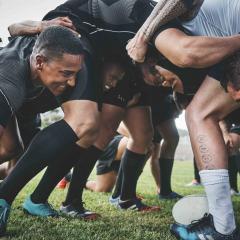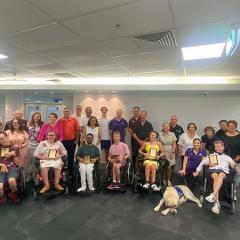Each month we shine the spotlight on a researcher in the Faculty of Health and Behavioural Sciences.
This month we spoke to Dr Rebecca Olive, Lecturer in the UQ School of Human Movement and Nutrition Sciences, Research Fellow with AustLit and Deputy Director (Public Engagement) of the UQ Centre for Sport & Society.
What are your key research interests?
I am a feminist cultural studies researcher and I study women and recreational lifestyle and action sports, in particular surfing. I’m interested in how everyday, recreational sport can be more available to more people, especially women. Recently, I’ve also started to think about how sports teach us about nature and environmental sustainability. Given my main focus is on surfing, it’s not surprising that I’m most interested in ocean environments. As a surfer myself, I know how much of an impact surfing has had on how much I care about the sea and the plants and animals that live in ocean ecosystems.
Can you share some of your career highlights so far?
Since coming to UQ my highlight has been my Research Fellowship with AustLit. Working with AustLit has been so inspiring, and I’ve learned a lot about how research projects can make room for undergraduate students to develop new skills, and for innovative collaborations that are imagined by the AustLit team (special mention to Catriona Mills).
AustLit have just launched Writing New Waves: On Surfing and Disability, a joint dataset of Dr Jessica White's project Writing Disability in Australia and my project Waves of Fiction: Surfing in Australian Literature. It’s an incredible resource that highlights how important the physical activity and sport of surfing has been, and remains, to Australian national identity.
I’ve also been so proud to work with the UQ Ally Network and the UQ Ally Network Action Committee, both of which are focused on greater inclusion and understanding related to LGBTIQ+ people, especially staff at UQ. Being part of the Ally Network requires me to put in to practice the ideals of diversity and inclusion that I advocate for in my research, here at UQ. (If you’re not part of the UQ Ally Network yet, you should check it out.) I was also stoked to publish a co-edited book with Holly Thorpe, Women in Action Sport Cultures: Identity, Politics and Experience. It was the first edited collection about women in lifestyle and action sports.
What aspects do you enjoy most about your work?
The three things I enjoy most about my job are collaboration, teaching and community engagement. I really love research collaborations. Working with other scholars to develop ideas is so rewarding and it takes the work so much further than it could go with me doing it on my own. I also get so much personal reward from undergraduate teaching. Higher education changed my life—it opened up the world to me—so I really love being part of that for students now. It’s pretty obvious that people are my favourite part of my job, and that is true of community engagement as well. Being connected in with community as part of my research methodology reminds me of why the work is important and pushes me to keep it relevant and meaningful for the people the work is about.
Has your career taken you to any interesting, far-flung locations?
Because I study surfing, I’m really lucky to be able to spend a lot of time at the beach as part of the research process. My main research site is Byron Bay (where I’m from), but I’ve most recently spent time with women who surf in Biarritz in France, Cardiff in Wales, and Ahipara in Aotearoa/New Zealand.
What inspired you to pursue a career in academia?
I got into academia because I wanted to get a better understanding of sex/gender politics in surfing culture, and research gives you the luxury of delving into topics in depth. Now I am inspired by the capacity for academia—research and teaching—to make people’s lives better. Academia has, and continues to, give me so much in so many ways and I constantly remind myself that comes with responsibilities to produce rigorous, meaningful work that makes important contributions towards greater social inclusion of more people.
What advice would you give to someone thinking about a research career?
Research is really rewarding, but it isn’t only done in universities. I know amazing researchers in the arts, media, sporting and community organisations, industry, and government. What you learn through developing good research skills can take you in all kinds of unexpected directions. You need to be open and flexible and have a clear philosophy about what research is to you – that way you’ll be able to do your work wherever you go!



